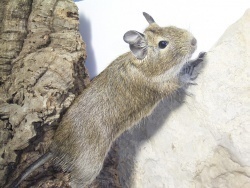
Diabetes mellitus - a common metabolic disorder in degus
This metabolic disorder can effect not only degus but also chinchillas, guinea pigs and rabbits. However, degus are particularly susceptible to foods that are too rich in nutrients. Elevated blood sugar levels over an extended period of time can lead to diabetes mellitus. But why are degus so susceptible to this metabolic disorder? The hormones insulin and glucagon have different structures in degus in comparison to other mammals. Insulin lowers blood sugar, which leads to blood sugar being absorbed by the cells of the body. Glucagon and insulin work together as counterparts and can raise blood sugar levels when needed. Glucose degradation in degus is thought to be negatively affected by this altered structure of insulin and glucagon.Food consumption is an extremely important factor in the development of diabetes mellitus.
The degu, a rodent, is originally native to Chile, a rather barren region. In their natural habitat these animals feed primarily on dry grasses, roots, barks, cactus plants and seeds. Unfortunately, many commercial feeds contain ingredients that are too high in energy and thus are not suitable for a degu’s diet. Degus should not be given feeds with high sugar content or fatty foods like nuts or sunflower seeds, as these can quickly make them overweight. They should also not be given fruits, as fruits are high in sugar, and sustained high blood sugar levels can result in diabetes mellitus. Typical clinical symptoms include increased water intake and increased urination. This metabolic disease is also often accompanied by weight loss, but these signs can also be due to other causes. Degus suffering from diabetes mellitus usually go blind due to cataract maturation. Treatment is difficult when the animal has already fallen ill. One can try to treat affected degu with insulin, but this is unfortunately quite difficult to do. One must also keep in mind that regular catching, restraining and injecting will be extremely stressful for the animal. A change to a more natural, species-appropriate natural diet will be much more beneficial, as well as the best prevention. These foods include hay and grass.
Degus can also be given unsprayed fruit tree twigs on which to nibble. Dried flowers can also provide a healthy variety.
Wiesenheu, made from meadow hay from the Alpine foothills, ensures a basic supply of crude fibre to which the animal should have unlimited access. Kräuterlinge and Sensitiv are also good, high-quality base feed substitutes which these animals also like to carry around and nibble on, and which help keep them occupied. Through careful air drying, Kräuterlinge and Sensitiv are free of dust and moulds and thus good alternatives for sufferers of hay dust allergies, whether that’s the degu or its owner.
Naturmix, a mixture of meadow grasses and herbs, leaves, blossoms and rose hips, can also be used as a supplemental feed fitting to the degu’s natural basic diet. Blütenmix is an especially aromatic supplement to hay. Its abundance of flowers is not only healthy, it also provides a variety of natural vital substances and secondary plant substances.
You’d like to offer your pet a healthy treat now and then, but most treats are not suitable for degus? No problem – Rosenblütenblätter and Ringelblumenblüten are healthy and natural alternatives to conventional treats.
Dr. med. vet. Katharina Boes
March 2017 ©AGROBS GmbH
Sources*:
March 2017 ©AGROBS GmbH
- A. Ewringmann, B. Glöckner: Leitsymptome bei Meerschweinchen, Chinchilla, Degus. Enke Verlag Stuttgart, 2012
- Gabrisch, Zwart: Krankheiten der Heimtiere. Schlütersche Verlag Hannover, 2015
(* The references refer to the technical content of the text and not to the product recommendations.)



